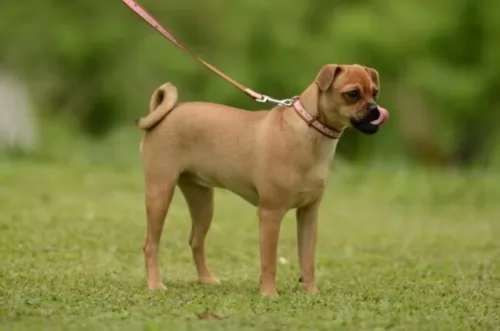 Petzlover
Petzlover Both Blue Lacy and Muggin are originated from United States. Blue Lacy may grow 39 cm / 16 inches higher than Muggin. Both Blue Lacy and Muggin are having almost same weight. Both Blue Lacy and Muggin has almost same life span. Blue Lacy may have less litter size than Muggin. Blue Lacy requires Low Maintenance. But Muggin requires High Maintenance
Both Blue Lacy and Muggin are originated from United States. Blue Lacy may grow 39 cm / 16 inches higher than Muggin. Both Blue Lacy and Muggin are having almost same weight. Both Blue Lacy and Muggin has almost same life span. Blue Lacy may have less litter size than Muggin. Blue Lacy requires Low Maintenance. But Muggin requires High Maintenance
 The Lacy brothers came to Texas in 1858, and this breed is named after them. They wanted a strong, robust working dog. It is a working/herding dog breed that originated in Texas in the mid 19th century.
The Lacy brothers came to Texas in 1858, and this breed is named after them. They wanted a strong, robust working dog. It is a working/herding dog breed that originated in Texas in the mid 19th century.
It is interesting to note that in June 2005, Governor Rick Perry brought about legislation adopting the Blue Lacy as the official Dog Breed of Texas. The breed is also registered by the National Lacy Dog Registry and the Animal Research Foundation.
Today the Blue Lacy is considered to be the perfect all-around dog, with the Lacy family history noting the breed to come from a mix of scent-hound, greyhound and coyote cross. There are theories around the scent hound used, with some believing it could have been an Italian Gray Hound, but whatever the case, the Lacy brothers established this breed under the guidelines required to develop a recognized breed.
 The Muggin is not a purebred dog but rather a cross breed. The hybrid dog population has exploding in the United States in the past ten to fifteen years. A lot of the success of crossbreeding can be attributed to the marketing of these dogs as “Designer Breeds”.
The Muggin is not a purebred dog but rather a cross breed. The hybrid dog population has exploding in the United States in the past ten to fifteen years. A lot of the success of crossbreeding can be attributed to the marketing of these dogs as “Designer Breeds”.
Designer breeds are developed because someone wants some of the characteristics of Breed X and some of the characteristics of Breed Y. Therefore, Designer breed XY is developed. In order to understand this hybrid dog, you need to understand the two purebred breeds they come from. The Muggin is the result of crossing the purebred Pug and the purebred Miniature Pinscher or Min Pin. So, we need to look at the origins of these two purebred breeds.
They are also referred to as Pin Pugs, Min Pin Pug, Pug Pin, Pugscher and were originally the Carlin Pinscher. However, these days there are other breeds besides the Pug and Min Pin making up the gene pool for the Carlin Pinscher. Because of this the Muggin has been separated from the Carlin Pinscher. The American Canine Hybrid Club has accepted the Muggin name for the Pug Min Pin cross.
Pugs are originally a Chinese breed and they were companions rather than working dogs of any kind. During the Han Dynasty they were the dogs of royalty. At the same time there were dogs very much like the pug in Japan and Tibet. The Pugs came to Europe by way of trades with the Dutch who then brought them to Europe. They were named the Mopshond and they caught the eye of the royalty in Europe as well.
Pugs were imported to the United States after the U.S. Civil War and in 1885 they were recognized by the American Kennel Club and called Pugs.
The Min Pin traces its origins to Germany a few hundred years ago. They were “ratters”, guarding the house and stables from all types of vermin. Most dog people believe that the Min Pin is much older than this, perhaps by thousands of years. Yet there is no detailed history to support that. Most believe the breed comes from the German Pinscher line. There might also be some Daschund and Greyhound in that line.
They were once called the Reh Pinscher. This was their name when they came to North America in 1919 and then the breed was renamed in 1972. The Miniature Pinscher Club of America was started in the early 1900’s while the AKC recognized the Min Pin in 1929. Today the Miniature Pinscher is a family dog, a companion.
The Muggin is a loving and loyal dog. All they want is for you to be happy and to share that happiness with them. They can also easily become a one person dog and bond intensely with that one person. They are not a hybrid that you can leave home alone while you go to work for 8 to 10 hours a day. No, the Muggin needs attention and lots of it. Despite this they are great with both kids and other dogs.
Because they are a cross breed, they are not recognized by the American Kennel Club. However, some hybrid registries do recognize the Muggin. These include the Designer Breed Registry, the International Designer Canine Registry, The Designer Dogs Kennel Club, the American Canine Hybrid Club, and the Dog Registry of America.
 The medium-sized, well proportioned, muscular and lithe Blue Lacy stands at roughly 46–53cm. He has a coat which is smooth and short and in an attractive gun-metal gray color which can be classified as blue or almost black. Other shades are also available such as cream, yellow, reddish and you also get tri-colored Lacy’s.
The medium-sized, well proportioned, muscular and lithe Blue Lacy stands at roughly 46–53cm. He has a coat which is smooth and short and in an attractive gun-metal gray color which can be classified as blue or almost black. Other shades are also available such as cream, yellow, reddish and you also get tri-colored Lacy’s.
Pure Blue Lacy’s have some white markings on their brisket. Whatever color you have, these clean-looking dogs with their low maintenance coats are referred to as Blue Lacy’s. Their brown eyes are bright and alert, they have long tails and their ears hang down.
The American Blue Lacy gives one the sense of speed, agility and endurance. He is intelligent, active and alert, being an all-round dog who can adapt to being among ranchers and cowboys and then become gentle with children and his family.
With socialization, he is also tolerant of other dogs. Because he is so intelligent he can be quickly trained, and training and socialization will be recommended for him to ensure he is the perfect all-rounder he was designed to be. His alertness makes him an excellent watch dog.
 As previously mentioned, the Muggin is a cross between the Pug and the Miniature Pinscher. They are small, shave sturdy legs, floppy ears, and a wrinkled forehead for the most part. Like all hybrids however, all first generation dogs do not look the same. Some might resemble the Min Pin more and others the Pug. Some might have the stockier body of the Pug and the short tail of the Min Pin. Or one could have the Pug’s curly tail and the athletic body of the Min Pin. The snout can be short or long, the ears heavy and floppy or small and thin.
As previously mentioned, the Muggin is a cross between the Pug and the Miniature Pinscher. They are small, shave sturdy legs, floppy ears, and a wrinkled forehead for the most part. Like all hybrids however, all first generation dogs do not look the same. Some might resemble the Min Pin more and others the Pug. Some might have the stockier body of the Pug and the short tail of the Min Pin. Or one could have the Pug’s curly tail and the athletic body of the Min Pin. The snout can be short or long, the ears heavy and floppy or small and thin.
Their coats will usually be fine and short, and colors can vary a lot. They might be black and tan like a Min Pin, or more like a Pug with a solid color of cream, brown, black, white or golden. They also tend to shed quite a bit no matter which parent they take after the most. They will either have brown noses and black eyes or brown eyes and black noses or any combination of black and brown.
If Muggins are only bred to Muggins the second and third generations will resemble each other more than the first generations will. However, at this point many breeders will try to strengthen the breed by occasionally adding in to the gene pool other dog breeds.
 Your Blue Lacy is such a low-maintenance, easy dog to have. Remember to have your puppy vaccinated from distemper, hepatitis, leptospirosis, parvovirus, and parainfluenza. These vaccinations start from 6 - 8 weeks of age. Also, because different areas have different regulations surrounding the rabies injection, check with your vet about this one.
Your Blue Lacy is such a low-maintenance, easy dog to have. Remember to have your puppy vaccinated from distemper, hepatitis, leptospirosis, parvovirus, and parainfluenza. These vaccinations start from 6 - 8 weeks of age. Also, because different areas have different regulations surrounding the rabies injection, check with your vet about this one.
A socialized, trained Blue Lacy makes such an awesome pet but you have responsibilities towards him. You need to know precisely what is required to keep him healthy and happy.
This is a versatile working dog who is intelligent and alert but also sensitive to being mistreated. Treat him decently and in exchange you’ll have a loyal, devoted canine family member.
 They are good with children but should be supervised.
They are good with children but should be supervised.
Energetic and loving little dogs.
Very adaptable if taken for walks or has space in a yard. Can live anywhere under those circumstances.
Very intelligent but strong willed dog. Needs strong leadership from their person.
 The Blue Lacy is generally a healthy breed, but just like with any other dog breed they will be prone to some health conditions. Blue Lacys can also suffer with the likes of hip or elbow dysplasia and hypothyroidism.
The Blue Lacy is generally a healthy breed, but just like with any other dog breed they will be prone to some health conditions. Blue Lacys can also suffer with the likes of hip or elbow dysplasia and hypothyroidism.
This is a disease of the hip where the ball and socket joint is malformed. Hip dysplasia is when the hip joints don’t develop normally. It needs to be watched as it can result in loss of function of the hip joints. The disease can often begin when the dog is still very young.
Some breeds are genetically predisposed towards hypothyroidism, but environmental factors and certain medications can trigger autoimmune reactions. Not only that, a tight collar can also cause thyroid damage. The symptoms of hypothyroidism are weight gain, skin problems, dislike of the cold and even hair loss and then it’s time to get your pet thyroid-tested.
 The first generation of Muggins may face all the health issues of either or both their parents, while second and third generations tend to have less health issues, They types of issues the first generation of Muggins might face include:
The first generation of Muggins may face all the health issues of either or both their parents, while second and third generations tend to have less health issues, They types of issues the first generation of Muggins might face include:
Nerve Degeneration – Degenerative Myelopathy or Dm – causes paralysis and eventually fatal.
 Typically of working breeds, the Blue Lacy is going to need a firm owner who provides guidance and leadership, and who is responsible with providing the Lacy with plenty of exercise. This dog was created for work, so they will be totally at home on a farm. If not, they will require long walks every day with lots of ball games too.
Typically of working breeds, the Blue Lacy is going to need a firm owner who provides guidance and leadership, and who is responsible with providing the Lacy with plenty of exercise. This dog was created for work, so they will be totally at home on a farm. If not, they will require long walks every day with lots of ball games too.
Care for the Blue Lacy doesn’t take much effort. He isn’t much of a shedder and therefore has low grooming requirements. He’ll require being brushed twice a week to get rid of loose hairs. If you start early with this grooming routine, he looks forward to this ‘bonding’ session.
Routine maintenance will require nail clipping and teeth cleaning as plaque can build up and leave your pet with dental problems and gum disease. Ask your veterinarian about dental care because there are special dog-designed toothpastes and brushes. Also check for ticks and fleas in and around the ears of your dog.
Your Blue Lacy is a high energy working dog so he will require a balanced diet to cater for his energy levels. He will certainly require some raw meat from time to time to avoid skin problems. Home prepared meals are also good and these can include rice, meat and vegetables.
Remember when in any kind of doubt, speak to your vet about dog food which meets the requirements of your dog, his age, his breed and his activity levels. Always have a bowl of clean, cool water available to him around the clock.
 This crossbreed has a definite propensity to overeat and become obese from puppyhood. Feed the puppy a small dog dry food 3-4 times a day a total of ¾ of a cup to 1 cup.
This crossbreed has a definite propensity to overeat and become obese from puppyhood. Feed the puppy a small dog dry food 3-4 times a day a total of ¾ of a cup to 1 cup.
Again don’t over feed the adult Muggin or he will become obese easily. Feed at least twice a day one to one and half cups total.
High Energy
With the athleticism of the Min Pin taking precedence over the less active Pug, the Muggin is a fairly active dog. The Muggin is also not effective by the Pug’s difficulty with heat and cold. They love to go on long walks and need exercise to keep from being bored and destructive. However, remember there is a Pug in your Muggin and if she is not into exercise don’t try to get her to do more than she can.
You do want your Muggin to get enough exercise to fend off any tendency to be overweight. They are good at agility, jogging, obedience and watchdog activities.